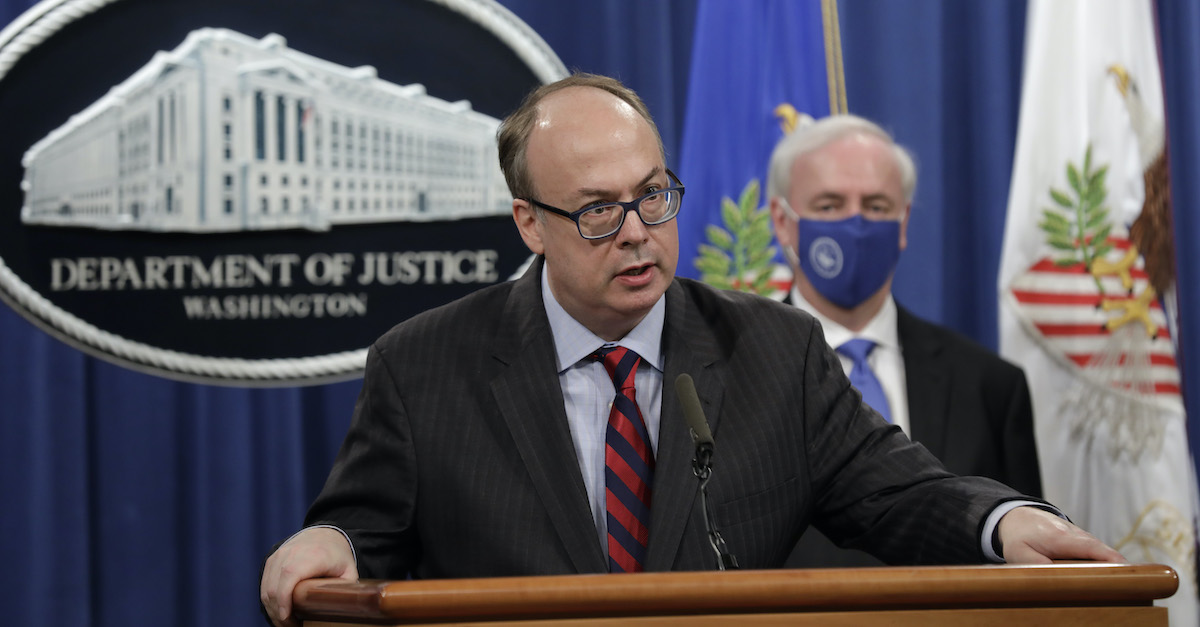
Acting Assistant U.S. Attorney General Jeffrey Clark speaks next to Deputy U.S. Attorney General Jeffrey Rosen at a news conference on Oct. 21.
Listen to the full episode on Apple, Spotify or wherever else you get your podcasts, and subscribe!
Even by the standards of a feverish post-election cycle, a recently disclosed effort by an ex-Department of Justice staffer seeking to undermine the election results in Georgia reached new heights of paranoia.
Jeffrey Clark, the former head of the Justice Department’s civil division under Trump, cited an unspecified theory about hackers having evidence that a Dominion voting machine “accessed the Internet through a smart thermostat with a net connection trail leading back to China,” according to communications first reported by ABC News last week.
Dated Dec. 28, a draft letter attached to that message urged top Peach State officials to evaluate supposed election “irregularities,” and Clark sent it to Acting Attorney General Jeffrey Rosen and acting Deputy Attorney General Richard Donoghue. Both reportedly rejected the overture, but the disclosure of the thwarted scheme reportedly spurred Rosen to share what he knew about the plans with the Justice Department’s inspector general and the Senate Judiciary Committee.
On the latest episode of Law&Crime’s podcast “Objections: With Adam Klasfeld,” New York University School of Law Professor Ryan Goodman reflects on last week’s revelations in Clark’s saga and what it means for what national security experts like him call the “insider threat.”
For “people who really believe it, it’s not a game,” Goodman noted. “They’re not pretending they really believe the conspiracies. There’s no reason why they wouldn’t be also part of our law enforcement, intelligence agencies, and the like.”
Just Security co-editor-in-chief Ryan Goodman appears on Law&Crime’s podcast “Objections: with Adam Klasfeld.”
An editor-in-chief for Just Security, Goodman recently co-authored a chronology outlining the post-election antics of former President Donald Trump’s former chief of staff titled: “Mark Meadows Timeline: The Chief of Staff and Schemes to Overturn 2020 Election.”
Dissecting the timeline, Goodman spotted what he called “nefarious—there’s no better word for it—emails from Mark Meadows to the Department of Justice” where the former chief of staff asked Rosen to have Clark investigate the results in Georgia.
“Jeff Clark has these bizarre conspiracy theories that he’s cooking up about, you know, Chinese thermometers, changing ballots,” Goodman noted, marveling at the far-out idea. “It’s even hard to say those words.”
Congressional committees likely will be looking into whether Meadows was involved in ex-parte communications between Trump and Clark.
“That really does seem like the coup,” Goodman said, adding later: “It’s very hard to imagine that Meadows would not be in the loop.”
Acting Defense Secretary Christopher Miller’s chief of staff Kash Patel reportedly said he was in “nonstop” contact with Meadows on Jan. 6th, Goodman, a former special counsel for the Department of Defense, noted.
The former Pentagon lawyer described that report as “deeply concerning” and “frightening.”
Pointing to a recent report by University of Chicago researchers, Goodman said that it pointed to a broader problem. The researchers, extrapolating from what they called a nationally representative survey of 1,070 people, estimated that some 21 million Americans believe that the 2020 election was stolen and “use of force is justified to restore Donald Trump to the presidency.”
Goodman fears that some of those Trump loyalists may still be in government.
He pointed to Washington Post reporters Carol Leonnig and Phillip Rucker’s book “I Alone Can Fix It,” showing—among other revelations—that some members of the U.S. Secret Service supported the Jan. 6th siege.
Listen to the podcast below:
(Photo by Yuri Gripas-Pool/Getty Images)